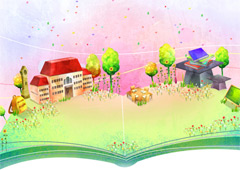What’s Your Story? Making a Powerful Case for the Library | Project Advocacy
 Nothing captivates and moves an audience like good storytelling. But when we tell the story of our library, do patrons feel that it represents them? That’s the question Michael Margolis, CEO of Get Storied, an organization devoted to transformational storytelling, posed to librarians at the 2013 American Library Association’s annual conference. Do principals, teachers, and students think our narrative matters to them? Margolis asked in his session, “Storytelling Mojo: Creating the 21st Century Library Narrative.” It’s imperative that they do.
Nothing captivates and moves an audience like good storytelling. But when we tell the story of our library, do patrons feel that it represents them? That’s the question Michael Margolis, CEO of Get Storied, an organization devoted to transformational storytelling, posed to librarians at the 2013 American Library Association’s annual conference. Do principals, teachers, and students think our narrative matters to them? Margolis asked in his session, “Storytelling Mojo: Creating the 21st Century Library Narrative.” It’s imperative that they do.
Too often, when advocating for our library programs, we focus on the institution rather than our listeners’ needs and connections to it. We may hone in on what we perceive our students need—not what needs they want met. When we offer to collaborate with teachers, is it more about us—or them?
We need to ask ourselves such questions. Telling the story of the library is an ongoing endeavor that conveys, in ways large and small, what we’re about. Every time we discuss a successful program, we reinforce our library’s importance to administrators, students, and teachers. Without a doubt, advocacy that works must be about the difference libraries make in the lives of students. To be effective, that story must be heard. Some of Margolis’s key recommendations for effective storytelling:
• Be aware of the audience and why this story matters to them: Why should they care?
• Recognize audience makeup: What’s the diversity of our intended audience?
• Be able to articulate what is at stake: Why is this crucial?
• Be a trustworthy witness: Do they believe in us?
• Ensure that listeners feel they belong in the story: Is this story about them?
• Anchor our story in something familiar: Do they relate?
Even in this data-driven age, we shouldn’t discount the importance of feel-good stories, Margolis adds. When lamenting budget cuts or demonstrating the effects of staffing reductions, it’s easy for our focus to turn negative—explaining what people would lose without a library, or laying out the facts and figures of deficit. Listeners picking up on this negativity often feel guilty and tense, Margolis points out—not the stuff of “feeling good.”
What if, instead, we paint a dream of what the library could be? Let’s help our audience envision a scenario a few years out when budgets are less tight. Or share a compelling vision of how the library might scaffold students and teachers during a budget crunch. The “Geek the Library” campaign, spearheaded by 2013 LJ Mover & Shaker Jenny Powell, is an excellent use of positive storytelling. With our audience’s moral support, we can envision a better library together—even if budget support is limited.
Listeners also have to feel safe and trusted in order to hear themselves in our tale, Margolis says. It’s easy to get angry and feel at odds with administrators or taxpayers whom we believe “don’t understand” our perspective. But they won’t hear us if they don’t sense our respect for their challenges.
He suggests finding the “invisible lines of connection” with our administrators, teachers, and students. We all care about the students and their literacy—that is one link to build on. Can we and our administrators co-create a new story of what a library is? Can we celebrate our successes together and center our story on our common dreams for the school?
Our world and needs are constantly changing, and we must be adept at persuading others to come along on our journey. Sometimes the narrative of change unintentionally repudiates the past, alienating listeners, Margolis says. We must find the connections between past and the future—reaching for those commonalities that bind us as collaborators, rejecting what divides us.
Librarians are often singletons in our schools. It’s easy to get myopic, focused on our own mission. But our mission is the school’s, too: It’s about serving student and teacher learning. That’s the story we need to tell every day.
We’ve been the curators of stories for centuries. But are we purveyors of our own? It’s time we should be.
Carolyn Foote is a “technolibrarian” at Westlake High School in Austin, TX. She blogs at Not So Distant Future.
RELATED
The job outlook in 2030: Librarians will be in demand
The job outlook in 2030: Librarians will be in demand
ALREADY A SUBSCRIBER? LOG IN
We are currently offering this content for free. Sign up now to activate your personal profile, where you can save articles for future viewing






Add Comment :-
Be the first reader to comment.
Comment Policy:
Comment should not be empty !!!